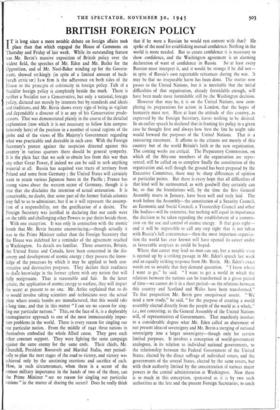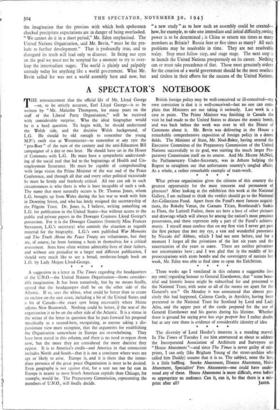BRITISH FOREIGN POLICY
IT is long since a more notable debate on foreign affairs took place than that which engaged the House of Commons on Thursday and Friday of last week. While its outstanding feature was Mr. Bevin's massive exposition of British policy over the widest field, the speeches of Mr. Eden and Mr. Butler for the Opposition, and of Mr. Noel-Baker winding up for the Govern- ment, showed strikingly (in spite of a limited amount of back- ter.ch hew firm is the adherence on both sides of the House to the principle of continuity in foreign policy. Talk of a Socialist foreign policy is completely beside the mark. There is neither a Socialist nor a Conservative, but only a national, foreign policy, dictated not merely by interests but by standards and ideals and traditions, and Mr. Bevin shows every sign of being as vigilant and dependable a director of it as any of his Conservative prede- cessors. That was demonstrated plainly in the course of the detailed explanation (into which it is not necessary to follow him compre- hensively here) of the position in a number of vexed regions of the globe and of the views of His Majesty's Government regarding what was practicable and desirable in each case. With the Foreign Secretary's protest against the suspicion directed against this country in various quarters there should be general sympathy. It is the plain fact that we seek to obtain less from this war than any other Great Power, if indeed we can be saia to seek anything material at all. Russia has acquired vast tracts of territory from Poland and some from Germany ; the United States will certainly want to retain various Japanese bases in the Pacific ; France has strong views about the western sector of Germany, though it is true that she disclaims the intention of actual annexation. It is conceivable, no doubt, that some part of the former Italian colonies may fall to us to administer, but if so it will represent the assump- f.on of a responsibility, not the gratification of a desire. The Foreign Secretary was justified in declaring that our cards were on the table and challenging other Powers to put theirs beside them.
With one exception. It was only in connection with the atomic' bomb that Mr. Bevin became unconvincing,—though actually it was to the Prime Minister rather than the Foreign Secretary that the House was indebted for a reminder of the agreement reached at Washington. Its details are familiar. Three countries, Britain, the United States and Canada, have been concerned in the dis- covery and development of atomic energy ;. they possess the know- ledge of the processes by which it may be applied to both con- structive and destructive purposes. They declare their readiness to shale knowledge in the former sphere with any nation that will fully reciprocate. That is reasonable and fair. In the latter sphere, the application of atomic energy to warfare, they will impart the secret at present to no one. Mr. Attlee explained that to do so would involve taking scientists and technicians over the actual plant where atomic bombs are manufactured, that this would take a long time, and that in this matter "I can see no reason for sing- ling out particular nations." This, on the face of it, is a deplorably unimaginative approach to one of the most immeasurably impor- tant problems in the world. There is every reason for singling out one particular nation.. From the middle of 1941 three nations in themselves embodied the whole Allied cause. They gave each other constant support. They were fighting the same campaign against the same enemy for the same ends. Their chiefs, Mr. Churchill, President Roosevelt and Marshal Stalin, met periodi- cally to plan the next stages of the road to victory, and victory was achieved only by the unstinting exertions and sacrifice of each. How, in such circumstances, when there is a secret of the utmost military importance in the hands of two of the three, can the Prime Minister "see no reason foi singling out particular nations" in the matter of sharing the secret? Does he really think that if he were a Russian he would rest content with that? He spoke of the need for establishing mutual confidence. Nothing in the world is more needed. But to create confidence it is necessary to show confidence, and the Washington agreement is an alarming declaration of want of confidence in Russia. So at least every Russian must interpret it, and it would be strange if he did not— in spite of Russia's own regrettable reticences during the war. It may be that no irreparable harm has been done. The matter now passes to the United Nations, but it is inevitable that the initial difficulties of that organisation, already formidable enough, will have been made more formidable still by .the Washington decision.
However that may be, it is on the United Nations, now com- pleting its preparations for action in London, that the hopes of humanity must rest. Here at least the attitude of this country, as expressed by the Foreign Secretary, leaves nothing to be desired. In an earlier speech he declared that in framing his policy in a given case he thought first and always how best the line he might take would forward the purposes of the United Nations. That is a reassuring statement. It affirms to the citizens not merely of this country but of the world Britain's faith in the new organisation. The coming weeks are critical. The Preparatory Commission, on which all the fifty-one members of the organisation are repre- sented, will be called on to complete finally the constitution of the organisation and, well though the ground has been prepared by the Executive Committee, there may be sharp differences of opinion at particular points. But there is every hope that all difficulties of that kind will be surmounted, as with goodwill they certainly can be, so that the foundations will, by the time the first General Assembly meets in January, have been well and truly laid. The work before the Assembly—the constitution of a Security Council, an Economic and Social Council, a Trusteeship Council and other like bodies—will be extensive, but nothing will equal in importance the decision to be taken regarding the establishment of a commis- sion on the use and control of atomic energy. If that goes right— and it will be impossible to call any step right that is not taken with Russia's full concurrence—then the most important organisa- tion the world has ever known will have opened its career under as favourable auspices as could be hoped. • Where that career may lead no man can say, but a notable vista is opened up by a striking passage in Mr. Eden's speech last week and an equally striking response from Mr. Bevin. Mr. Eden's exact words are so notable that they demand quotation. "I know where I want to go," he said. "I warn to get a world in which the relations between the nations can be transformed in a given period of time—we cannot do it in a short period—as the relations between this country and Scotland and Wales have been transformed." To that proposition Mr. Bevin gave unequivocal assent. "We need a new study," he said, "for the purpose of creating a world assembly elected directly from the people of the world as a whole," i.e., not consisting, as the General Assembly of the United Nations will, of representatives of Governments. That manifestly involves to a considerable degree what Mr. Eden called an abatement of our present ideas of sovereignty and Mr. Bevin a merging of national sovereignty into a larger sovereignty—though only for certain limited purposes. It involves a conception of world-government analogous, in its relation to individual national governments, to the relationship between the Federal Government of the United States, elected by the direct suffrage of individual voters, and the governments of the several States, elected by the same voters, but with their authority limited by the concentration of various major powers in the central administration at Washington. Now there is so much in this conception, sponsored as it is by two such authorities as the late and the present Foreign Secretaries, to catch the imagination that the provisos with which both spokesmen checked precipitate expectations are in danger of being overlooked. "We cannot do it in a short period," Mr. Eden emphasised. The United Nations Organisation, said Mr. Bevin, "must be the pre- lude to further development." That is profoundly true, and to disregard its truth will lead only to disaster. In fixing our eyes on the goal we must not be tempted for a moment to try to over- leap the intermediate stages. The world is plainly and palpably unready today for anything like a world government. What Mr. Bevin called for was not a world assembly here and now, but "a new study" as to how such an assembly could be created— how, for example, to take one immediate and initial difficulty,voting power is to be determined ; is China to return ten times as many members as Britain? Russia four or five times as many? All such problems may be resolvable in time. They are not resolvable tcday. Step must follow step, and stage stage. The next step is to launch the United Nations prosperously on its career. Nothing can or must take precedence of that. Those most genuinely ardent for the creation of a world government should be the most resolute and tireless in their efforts for the success of the United Nations.































 Previous page
Previous page